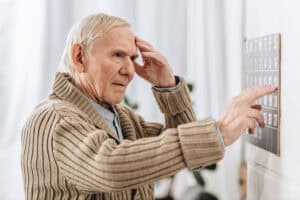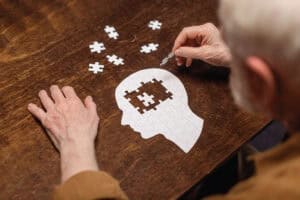We all run into forgetfulness from time to time. Age-related memory loss is something that usually develops with age and is usually not a cause for concern. Some memory loss occurs only temporary and resolves after a while.
But there are other types of memory loss that don’t go away and get worse over time due to some underlying cause and may lead to persistent amnesia. This can potentially cause significant interference with everyday activities.
Since several causes of memory loss are treatable, it’s important to get diagnosed as soon as you start experiencing the symptoms.
Some of the most common symptoms of memory loss are:
A variety of issues can cause memory loss. From forgetting things time to time to more serious memory impairment such as illnesses. There are many reasons for different types of memory loss.
Here are a few common causes of memory loss:

There are usually no major disruptions to your daily life when you experience normal age-related forgetfulness. It does not result in drastic memory loss. You might occasionally forget a person’s name but remember it again later in the day.
Certain prescription drugs and medications can interfere with or cause memory loss. These include antidepressants, tranquillizers, sleeping pills etc.
Dementia is the progressive loss of memory and other abilities that drastically impact daily routine. These can include memory loss, problems with intellectual skills and decision-making. Although there are many causes of dementia, the most common is Alzheimer’s.
Alcoholism can both cause and worsen the symptoms of memory loss. It can also interact with medications in a harmful way, leading to memory loss.
Studies show that people over the age of 75 who smoke find it more difficult to put faces with names than those who don’t, and their performance in memory tasks diminishes rapidly.
Depression and stress or anxiety can interfere with concentration, focus, and memory. Stress is a known factor in the development of this problem. It can be caused by an intense emotional trauma and lead to memory loss.
A head injury can lead to memory problems. Over time, memory may gradually improve. But in some cases, it can get worse if left untreated.
Memory improves with a healthy sleep routine. Too little sleep can cause fatigue and lead to memory problems.
Vitamin B-12 is an important vitamin for maintaining healthy nerve cells and red blood cells. A lack of it can cause problems with memory and other mental processes.
Transient global amnesia is a clinical syndrome characterized by the inability to form new memories. It is typically not harmful and doesn’t usually last long.
Hypothyroidism is a condition where the thyroid gland produces and releases less than normal hormone levels in the body. This can lead to forgetfulness and other thinking problems.
Memory problems can also develop due to tumours, infection, or injury to the brain.
Any major surgery can also cause memory loss.

If you have memory problems that are interfering with your everyday life, it is high time to see a doctor to know the cause of your memory loss and possible treatments.
Your doctor will take a medical history and neurological exam to determine the cause and severity of your memory loss. Depending on their findings, they may request blood, urine or other tests, including magnetic resonance imaging scans (MRIs), computerized axial tomography (CAT), cerebral angiography, etc.
Your doctor might also ask questions relevant to your life to know more about the problem. For instance, when did your memory problems start? Are you currently under any kind of medication? Do you consume alcohol or not, and if yes, what is the quantity? And similar questions.
This question and answer session can also become a judgement parameter for your memory and other thinking skills.
Here are a few memory loss treatments:
Certain activities might help with the prevention of memory loss:
Physical activity can help to maintain healthy circulation of blood in your body. Regular exercise can thus help keep your memory intact.
To keep your brain healthy and fend off memory loss, engage in mentally stimulating activities, such as playing word games and other memory games, which can contribute to a healthier memory.
A person who lives alone and suffers from mental health issues should get social. Friends, family and other social groups are great for building a support system which can be crucial in alleviating stress and improving memory function.
Sleeping is important for maintaining a healthy memory. Keeping a sleep schedule will help you get the rest you need. If you are an adult, consider having 7-9 hours of sleep each day to maintain good health and memory.
Maintaining a healthy diet can be highly beneficial for your brain and memory.
It is natural for people to forget things from time to time. Mild memory loss increases with age and is often not cause for concern. However, dementia caused by Alzheimer’s disease and other such conditions can be serious and need treatment.
Proper care also must be taken, such as having enough sleep, staying mentally active etc., to have a healthy mind and memory. To know more regarding this issue, visit the CK Birla Hospital or book an appointment with Dr. Sonali Bali.